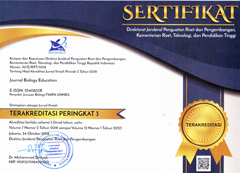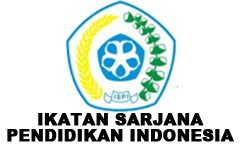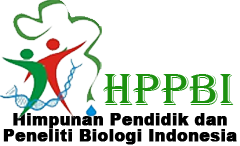EFEKTIVITAS MODEL PROBLEM BASED LEARNING BERBANTUAN MEDIA AUDIO-VISUAL TERHADAP MOTIVASI DAN HASIL BELAJAR SISWA PADA MATERI SISTEM EKSKRESI
Abstract
Penelitian ini bertujuan untuk menguji efektivitas model PBL berbantuan media audio-visual terhadap motivasi dan hasil belajar siswa. Penelitian ini menggunakan rancangan Experimental Design, dengan menggunakan dua kelas sebagai kelas eksperimen dan kelas kontrol. Populasi dalam penelitian ini adalah seluruh siswa kelas VIII SMP Negeri 1 Garung sedangkan sampel dalam penelitian ini adalah kelas VIII A (kelas eksperimen) menggunakan model PBL berbantuan media audiovisual dan kelas VIII B (kelas kontrol) menggunakan pembelajaran kooperatif. Data motivasi belajar siswa diperoleh melalui angket. Data hasil belajar kompetensi pengetahuan siswa diambil dari tes tertulis materi sistem ekskresi, kompetensi keterampilan diambil dari pengamatan, dan kompetensi sikap dari angket penilaian diri, antar teman, dan pengamatan. Teknik analisis data dengan menggunakan deskriptif persentase dan uji t. Hasil penelitian menunjukkan model PBL berbantuan media audio-visual efektif terhadap motivasi dan hasil belajar. Dilihat dari persentase siswa termotivasi sebesar 100%, siswa tuntas kompetensi sikap sebesar 100%, kompetensi keterampilan 91%, kompetensi pengetahuan 79%, dan hasil uji t menunjukkan bahwa hasil belajar kompetensi pengetahuan kelas eksperimen lebih baik dari kelas kontrol dari nilai thitung= 4,56 > ttabel = 2,04. Kesimpulan dari penelitian ini adalah model PBL berbantuan media audio-visual efektif terhadap motivasi dan hasil belajar siswa.
Â
The purpose of this research was to examine the effectiveness of PBL model assisted audio-visual media toward students’ motivation and learning outcomes. This research used Experimental Design and used two classes as experiment and control class. The population on this research was the students of class VIII of SMP 1 Garung while the sample is class VIII A (experiment class) used PBL model assisted audio-visual media and class VIII B (control class) used cooperative learning. The motivation data of student’s learning achieved is by questionnaire. Data of student’s knowledge competence learning result taken from written test of materials excretion system, competence skill is taken from the observation, attitudes, and competencies of self-assessment questionnaire, among friends, and observations. The data analysis technique used descriptive percentage and t-test. The result of this research showed that the PBL model assisted audio-visual media was effective for students’ motivation and learning outcomes. Judging from the percentage of students motivated by 100%, students completed the competence of the attitude of 100%, 91% competency skills, 79% knowledge competencies, and the result of t-test showed that the results of experimental class knowledge learning competence better than control class from score t = 4,56> ttable = 2,04. The conclusion from this research is the PBL model assisted audio-visual media effectively to students’motivation and learning outcomes
References
Arends, R. I. 2008. Learning to Teach. Terjemahan Helly Prajitno. Yogyakarta: Pustaka Belajar.
Bandura, A. 2001. Social cognitive theory: an agentic perspective. Annu Rev Psychol, 52: 1-26.
Ciardello, A. V. 2003. To wander and wonder: pathways to literacy and inquiry through question-finding. J Adolescent Adult Literacy, 47 (3): 228-239.
Danial, M. 2010. Pengarug Strategi PBL terhadap Keterampilan Metakognisi dan Respon Mahasiswa. J Chem, 11 (2): 1-10.
Fauzi, R. 2014. Peningkatan Hasil Belajar Siswa Melalui Model Problem Based Learning. Skripsi. Lampung: Universitas Lampung
Garcia J, Manzano P, dan Perez J E. 2015. Measuring the influence of active learning (CL and PBL) in students’ generic competences [Artikel]. Available at http://www.researchgate.net/publication/228967196 pada tanggal 03 Juli 2015
Hancock, D. 2004. Cooperative learning and peer orientation effect on motivation and achievement. J Edu Res, 97 (3): 159-166.
Haryoko, S. 2009. Efektivitas pemanfaatan media audio-visual sebagai alternatif optimalisasi model pembelajaran. J Edukasi Elektro, 5 (1): 1-10.
Hoffman, B. & Ritchi, D. 1997. Using multimedia to overcome the problems with Problem Based Learning [Abstrak]. Online at http://link.springer.com/article/ pada tanggal 20 Januari 2015.
Johnson, D. W. & Johnson, R. T. 1999. Making Cooperative Learning Work. J Theory Practice, 38 (2): 67-73.
Miri B, David B, Uri Z. 2007. Purposely teaching for the promotion of higher-order thinking skills: a case of critical thinking. J Res Sci Edu, 37: 353-369.
Oostendorp H.V & Mul S.D. 1999. Learning by exploration: thinking aloud while exploring an information system. J Instr Sci, 27: 269-284.
[Permendikbud]. 2014a. Peraturan Menteri Pendidikan dan Kebudayaan Nomor 103. Pembelajaran Pada Pendidikan Dasar dan Pendidikan Menengah. Jakarta: Kemendikbud.
Redhana, I. W. 2007. Efektivitas pembelajaran berbasis masalah pada mata kuliah kimia dasar II. J Pend Pengajaran UNDIKSHA 2: 317-334.
Rohmawati, N. 2013. Penerapan Model Pembelajaran Problem Based Learning untuk Menungkatkan Motivasi Berprestasi dan Prestasi Belajar Fisika. Skripsi. Malang: Universitas Malang.
Setyorini, U., Sukiswo, S. E. & Subali, B. 2011. Penerapan model Problem Based Learning untuk meningkatkan kemampuan berpikir kritis siswa. J Pendidikan Fisika Indonesia 2 (7): 52-56.
Slameto. 2010. Belajar dan Faktor-faktor yang Mempengaruhinya. Jakarta: Rineka Cipta
Susilo, A. B. 2012. Pengembangan model pembelajaran IPA berbasis masalah untuk meningkatkan motivasi belajar dan berpikir kritis. J Primary Edu 1 (1): 57-63
Uno, H. B. 2014. Teori Motivasi dan Pengukurannya. Jakarta: Bumi Aksara.
Wasonowati R R T, Redjeki T, & Ariani S R D. 2014. Penerapan model PBL pada pembelajaran hukum dasar kimia ditinjau dari aktivitas dan hasil belajar siswa. Ju Pendidikan Kimia (JPK), 3 (3): 66-75.
Yune, S. J., Im S. J., Lee S.H, Baek S.Y, & Lee S.Y. 2010. Effects of differences in problem-based learning course length on academic motivation and self-directed learning readiness in medical school students [Abstrak]. Korean J Med Edu, 22 (1): 23-31. Online at http://europepmc.org/
The copyright of the article once it is accepted for publication shall be assigned to the journal as the publisher. The intended copyright includes the right to publish the article in various forms (including reprints). The journal maintains the publishing rights to the published articles.
This work is licensed under a Creative Commons Attribution 4.0 International License.







